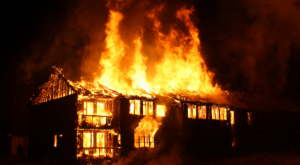If you have ever had a house fire, then you know how stressful it can be. The last thing that homeowners want to worry about is the insurance company and what they might do or not do for them after their house burns down. Unfortunately, many people don’t realize this until it’s too late and their policy has expired or the damage from the fire exceeds the value of their home. If your home was destroyed by a recent hurricane or another natural disaster, then there are special claims processes in place that may help expedite your claim process as well as provide additional benefits to supplement those already offered under standard policies.

1. Insurance companies will pay for any structural damage to the home
When you have home insurance, the insurance company will send an adjuster to your home to assess the damage and prepare an estimate for you. The adjuster will make separate payments for living expenses, damaged possessions, and alternate accommodations while you are out of town. The amount of coverage will vary from company to company. Most policies include ordinance coverage. If the damage to your home is due to local laws and ordinances, your insurer will pay for this.
The other structure coverage insures buildings and structures that are separate from the main home. The amount of coverage depends on the type of insurance policy you choose. It will typically be around 10% of the dwelling coverage. Personal property coverage protects your possessions outside of the home. Some insurance companies Omaha NE will cover your credit cards and other items outside the house, as long as they are not part of the home. Your insurance company will pay for any structural damage to your house as long as you have enough coverage.
Insurance company will pay for any structural damage to your home. You may need to make structural changes to bring the home up to current building codes. If the damage is beyond the amount the insurance company will pay, you can reopen your claim and get the money you need. You can also request more money to repair the damages, but this is often limited to 20% of the insurance coverage. In addition to paying for repairs, your insurance company will pay for reasonable additional living expenses.
2. The homeowner is responsible for paying for anything not covered by their insurance company, such as furniture, clothes, and other personal items
If you are the proud owner of a new home, there are several responsibilities you have to shoulder. As a homeowner, you’re responsible for ensuring that your house is in good repair, insuring it, and paying for routine maintenance. As a neighbor, you’re also responsible for making sure that the neighborhood is clean and safe for everyone. And, you’re a part of that community!
However, you may need to pay extra for your living expenses during the repair process. While the home is uninhabitable, you’ll need to find alternate housing. Fortunately, homeowners insurance will pay for the cost of living while the repairs are completed. And, if you cause the damage, you’re not covered. That means that your insurance company will pay for your rent or other expenses while you wait for the insurance claim to be processed.
Loss of use is another important part of homeowners insurance. In case of a catastrophe, you may need to find alternative living arrangements. Fortunately, most homeowners insurance policies include a section on the loss of use, which can cover the cost of hotel bills, laundromat bills, and other living expenses. This is known as additional living expenses. You can even get higher amounts if you need them, as long as it is within the limits of the homeowners’ policy.
3. When the house burns down in a fire or natural disaster, you may be able to get temporary housing from an organization until you can find a new place to live
When your house is destroyed by a fire or a natural disaster, you should be prepared to take care of your home. In case of a catastrophic event, your homeowner’s insurance will cover the costs of shelter and temporary housing. However, you should make sure that you familiarize yourself with your policy before the event. This way, you will be able to clarify your responsibilities and get some help. In addition, disaster relief agencies are available to assist people in need.
In case of a fire, you should immediately contact your insurance agent and restoration specialists. You should cut holes in the roof, contact your landlord and mortgage company, and contact community groups and organizations. Moreover, you should drain all the water lines to make sure that there is no contamination. If your house is damaged by smoke, you can also make use of your homeowner’s insurance coverage to replace your belongings.
Taking out homeowners insurance is an essential step if you lose your home. If your insurance doesn’t cover all of your personal belongings, you can still claim compensation through your insurance agency. Your coverage may cover up to 50% of the value of your home. Hence, you can use any remaining funds for buying a new home or rebuilding your existing one. Your insurance coverage must cover your mortgage, so you can pay it off first.
4. You should contact your insurance company about what steps to take when your house burns down – they’ll provide information on what types of benefits are available and how much coverage you have
Once the fire is under control, contact your insurance company immediately. This will ensure that you have all the information you need when you need it. Having your policy ready to hand over during a disaster can make the whole process easier and less stressful. If your insurance policy covers the loss of your property, this can be an important part of the recovery process. It’s also worth your time to review your coverage carefully and prepare yourself mentally and emotionally.
In addition to contacting your insurance company as soon as you can, you should also contact the local fire department. They can provide you with the information you need. You should also take photos of the damage and the destruction so that you can properly document the loss. If you’re unable to find the photos, you can write to your insurance company for assistance. Even if your house was destroyed, you can still make your car payments and replace any lost credit cards. You’ll need to pay for living expenses while you’re waiting for the payout from your insurer.
Also to the fire department, you may also need to contact your insurance company. The report contains important information about the fire and will often be available for the public. To obtain your copy, contact your local fire marshall, fire prevention bureau, or fire department billing agency. You’ll need this information to file a claim with your insurance company. The report will show how your house was when first responders arrived and will help your insurance company assess the damage.

5. Your insurance company might also give you money if it’s determined that the fire was caused by arson or vandalism so that you can replace all of your belongings with items of similar value
Your insurance company might give you money if you’re in an accident. If you were to get into an accident and cause more damage to your car, the insurance company may reimburse you for the damages. If you can’t afford to repair the car, the insurance company might reimburse you for the transportation costs. You should ask your insurance company what they will pay you for the transportation and rental car. You should never let an insurance company tell you that they’re not obligated to cover the expenses.
When you have an accident, you might get money from your insurance company. Depending on your policy, you might receive several checks. The first check will cover the damages to your vehicle, the second will be for additional living expenses. The second check might be for the structure and belongings. You never know what you might get. You should ask your insurance company what they’ll do when you need to file a claim.
CONCLUSION
The insurance company will help the homeowner to get back on their feet. They’ll provide a temporary place for them and meet with an appraiser to determine how much it would cost to replace all of your belongings. If you don’t have renters’ insurance, they may offer a settlement that is less than what everything was worth before the incident occurred. For homeowners who do have renter’s coverage, there might be some money available from those policies as well so make sure you check if this applies to you! Your insurance agent can help guide you through the process and answer any questions along the way.